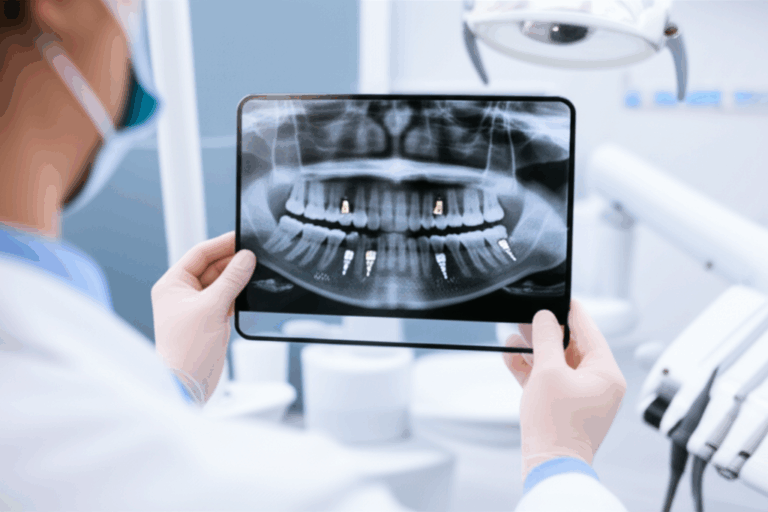
Can Dental Problems Cause a Sore Throat? Understanding the Surprising Connection
Outline Overview
- The Spread of Infection
- Inflammation and Nerve Pathways
- Lymphatic System Reactions
- Dental Abscess and Infections
- Impacted Wisdom Teeth and Pericoronitis
- Gum Disease and Periodontitis
- TMJ Disorders (Jaw Problems)
- Complications After Tooth Extraction
- Oral Thrush and Fungal Infections
- Dental Exam Process Explained
- Medical Testing
- Real-World Treatments
Introduction: My Surprising Journey Linking Teeth and Throat
Let me start off by saying something: for years, I didn’t really think about how my teeth and throat could be connected. If I got a sore throat, I used to blame dry weather, allergies, or just catching a cold. But that changed after I had a pain in my lower jaw that also made my throat hurt for days. The more I found out, the more I saw how easy it is to miss important clues when pain goes from teeth to throat.
So in this article, I’ll share what happened to me—step by step, pain by pain—about how problems in your mouth really can upset your throat, sometimes in ways that could surprise you. Don’t blink—you might find out that your dental issues are to blame for that stubborn sore throat, and what you can actually do about it.
Table of Contents
- How Dental Problems Can Lead to Sore Throats
- Dental Conditions I’ve Seen Trigger Sore Throats
- Warning Signs I Never Ignore
- When I Decided to Seek Professional Help
- How Diagnosis and Treatment Worked for Me
- The Power of Prevention: Protecting Both Your Mouth and Throat
- Key Takeaways: The Mouth-Throat Connection
- Frequently Asked Questions
- References & Further Learnings
How Dental Problems Can Lead to Sore Throats
The Spread of Infection
One morning, I woke up with really bad tooth pain, but I also noticed my throat was scratchy and felt swollen. It made it hard to swallow. I thought it was just bad luck. But soon I learned that dental infections—from a big cavity, cracked tooth, or gum problem—can let germs get out and move into nearby parts of your mouth and face. My sore came from a dental abscess, a little pouch of pus near my molar, and those germs moved into the soft parts around my jaw and throat.
Germs don’t just stay put when they get wild. They can move into your jaw, cheeks, even your throat. Since your throat is so close to the back teeth and gums, it’s not far for trouble to reach. If the infection gets really bad, it can cause very scary stuff like Ludwig’s Angina, which can even block your airway.
Inflammation and Nerve Pathways
After that rough time, something else caught my attention. Sometimes when my tooth pain got a little better, my throat still hurt. This confused me until I found out about “referred pain.” The nerves in the mouth, jaw, and throat are like a big bundle all hooked up together. Swelling in your teeth or gums can mean your throat or ear hurts too, even if nothing’s wrong there, because the nerves all talk to the same place in your brain.
Lymphatic System Reactions
Have you ever had a sore throat and felt lumps under your jaw or in your neck? That’s because those are your lymph nodes, and they get bigger when fighting germs. If you have a tooth or gum infection, your body gets ready for battle and those lymph nodes might swell, not just from a cold, but from dental problems too.
Dental Conditions I’ve Seen Trigger Sore Throats
I’ve run into a few of these myself, and watched friends and family face them too. Here’s what I noticed most:
Dental Abscess and Infections
A dental abscess is kind of like a mini volcano in your mouth—painful and full of pus. My experience started as a dull pain and turned into swollen cheeks, fever, and a nasty taste in my mouth. I didn’t know the infection was starting to push into my throat, making it sore and swallowing tough.
Signs to watch for:
- Steady, throbbing tooth or jaw pain
- Swollen lymph nodes
- Fever or chills
- Swelling in your cheeks or under your jaw
- Bad taste (sign of pus draining)
Sometimes these infections go very deep and can make your breath bad, make it hard to swallow, and even block your airway. If you have bad pain and a sore throat at the same time, get help fast!
Impacted Wisdom Teeth and Pericoronitis
When my bottom wisdom tooth started to come out, I was surprised the pain moved around. When it couldn’t come in right, the gum above it got sore and red, and the same side of my throat got scratchy and puffy. That’s called pericoronitis—when germs and food get stuck under the gum flap of a partly out tooth.
It’s all close together—irritation in your gums and jaw can move pain to your throat and sometimes your ear. Watch for:
- Stiff jaw
- Swelling along the jaw
- Bad breath
- Sore throat on the same side as your wisdom tooth
Don’t ignore it—if you let it go, the infection gets worse and can cause abscesses.
Gum Disease and Periodontitis
Gum disease may not seem like a big deal at first, but it can be. When my gums started bleeding from lazy brushing and flossing, my throat became tickly and sore more often. If your gums stay infected for a long time, all that swelling can move over to your throat. It’s not the most common cause, but if your gums are really bad, you can also feel flu-like, feverish, or get repeated sore throats.
TMJ Disorders (Jaw Problems)
TMJ (short for temporomandibular joint) problems are something I know well—I grind my teeth in my sleep. One surprise: the pain didn’t stick around my jaw, but traveled down my neck and even into my throat.
Why? Clenching and grinding tighten up your jaw muscles and the joint, and the nerves in that area can send pain signals to your throat too. If it hurts to yawn or your jaw clicks or pops, and your throat feels tight, this could be why.
Complications After Tooth Extraction
After getting a wisdom tooth pulled, I thought I was done. But a few days later, my throat started hurting on that side. I ended up with a “dry socket”—when a blood clot doesn’t form or falls out where the tooth was, and the bone or nerves are exposed. That pain can shoot up into your throat. Also, if there’s leftover food or infection, it can bother your throat too. Watch for:
- Bad smell from where the tooth was
- Strong, throbbing pain that moves to your ear or throat
- Hard time swallowing
Oral Thrush and Fungal Infections
One time, after taking antibiotics for a sinus infection, I got a white coating on my tongue and inside my cheeks that burned. The pain spread to my throat too. My dentist said it was oral thrush, a yeast infection in the mouth. When it spreads, it can make your throat burn or itch.
Warning Signs I Never Ignore
What I’ve learned: your mouth and throat give you early alarms. Some things you can watch from home, but some need a dentist or doctor, ASAP. If you see any of these, don’t wait:
- Fever and chills that stick around
- Swelling of your jaw, face, or neck
- Sore throat plus tooth or gum pain
- Trouble swallowing, breathing, or opening your mouth wide
- Bad breath that doesn’t get better
- Pus or blood from your tooth or gums
- Lots of drooling (especially in kids)
If you have these AND a sore throat, time to call for help.
When I Decided to Seek Professional Help
Sometimes you can handle stuff at home, sometimes you have to go see a pro. For me, I finally asked for help when:
- Regular painkillers and saltwater rinses stopped working
- I got feverish, weak, and tired
- My jaw swelled on one side (my partner said I looked like a chipmunk)
- Swallowing hurt and my throat was raw on one side
It’s tempting to “wait it out,” but when pain goes from your mouth to your throat (and you feel crummy all over), it’s too risky. Teeth infections can get really dangerous, really fast—sometimes even deadly. Don’t mess around—see a dentist, or if breathing is hard, go to the ER.
How Diagnosis and Treatment Worked for Me
Dental Exam Process Explained
The dentist first had a look around in my mouth with a mirror, then tapped on teeth and asked questions. Then I had some X-rays, which highlight places with infection or hidden wisdom teeth. Sometimes they use a cold spray or tiny tool to find the painful tooth. If your mouth looks okay but your throat still kills, you might also need to see an ENT doctor.
Medical Testing
One time I got my throat swabbed and had a little blood test to check for things like strep throat, tonsillitis, or viruses. In rare times, if the infection is deep and serious, you might get a CT scan to spot tricky abscesses in your jaw or neck.
Real-World Treatments
When my abscess was found, we didn’t wait around. Here’s how it went:
- Started on antibiotics to calm the infection, especially since I had a fever.
- Draining the abscess came next—not pleasant, but it helps super fast.
- In bad cases, the tooth gets pulled or fixed with a root canal.
- For jaw pain from TMJ, my dentist told me to use a night guard, which I got from a night guard dental lab.
- For that mouth fungus, antifungal mouthwash and time did the trick.
Just remember—everyone’s path is different. Only a dentist knows what’s right for you, so don’t try to fix big trouble at home.
The Power of Prevention: Protecting Both Your Mouth and Throat
Looking back, I could have skipped a lot of pain if I kept up decent tooth brushing and check-ups. Here’s what I do now:
- Brush and floss every day (even when I don’t feel like it)
- Visit the dentist twice a year—it’s worth it
- Don’t put off little tooth or gum pains—small problems grow fast
- Use mouthwash if your dentist says so
- Take care of jaw pain and clenching early on
- Skip smoking and too many sweets
Stress makes teeth grinding worse (and teeth problems in general). Managing stress and using mouth guards that fit well, made by a good china dental lab, can keep both teeth and throat safe.
I also learned that crowns, bridges, and even dental implants (when done by a solid crown and bridge lab or implant dental laboratory) make a real difference—less places for germs to hide means a happier mouth and throat.
Key Takeaways: The Mouth-Throat Connection
Teeth and sore throats are close neighbors. What I learned is simple but important:
- If your sore throat shows up with mouth trouble, pay attention.
- Lots of dental problems (like tooth abscesses or wisdom teeth) can cause pain in your throat.
- Prevention, acting early, and seeing a dentist can help both your teeth and your throat.
If you want more on how infections in your mouth affect your health in general, see this piece on teeth health. For a simple guide to dental disease, check dental diseases.
Frequently Asked Questions
Q: Can a simple cavity really cause a sore throat?
A: Not usually, but if the cavity goes deep and gets infected (like an abscess), it definitely can—especially if the germs spread.
Q: Is it normal for my jaw and throat to hurt after dental work?
A: Some pain is normal for a day or two, but if the pain is really bad, lasts a long time, or comes with fever or swelling, get it checked.
Q: How do I know if my sore throat is from my teeth and not a cold?
A: Look for clues: tooth pain, swollen gums, weird taste in your mouth, but no cough or runny nose. Still not sure? See your dentist or doctor.
Q: Do dental appliances make a difference?
A: Yes. Night guards, crowns, and implants—if made to fit by a good digital dental lab—keep your mouth healthier and cut down on things that can bother your throat.
References & Further Learnings
What helped me put this all together:
- Talking honestly with my dentist and doctor
- Good info from teeth information
- Hearing stories from real people and dental helpers
Remember: everyone is different and everyone’s story is real. The link between sore throats and dental health isn’t fake—it’s something I now always take to heart.
In the end, listening to your body—and your dentist—keeps not just your teeth, but your throat, feeling better. If you’re not sure, ask your dental pro. That’s what saved me.








